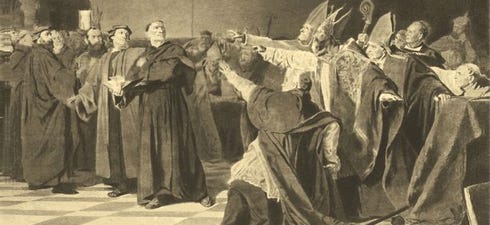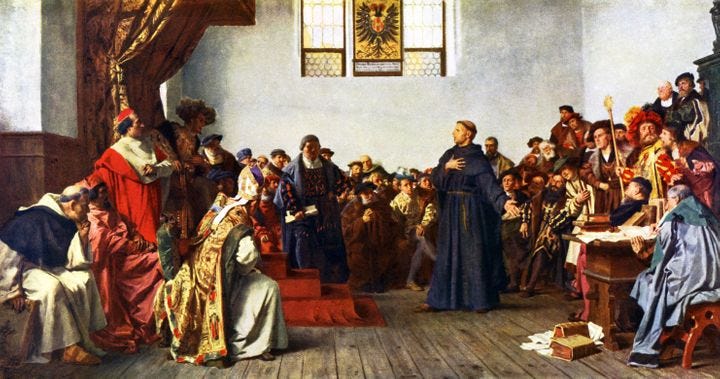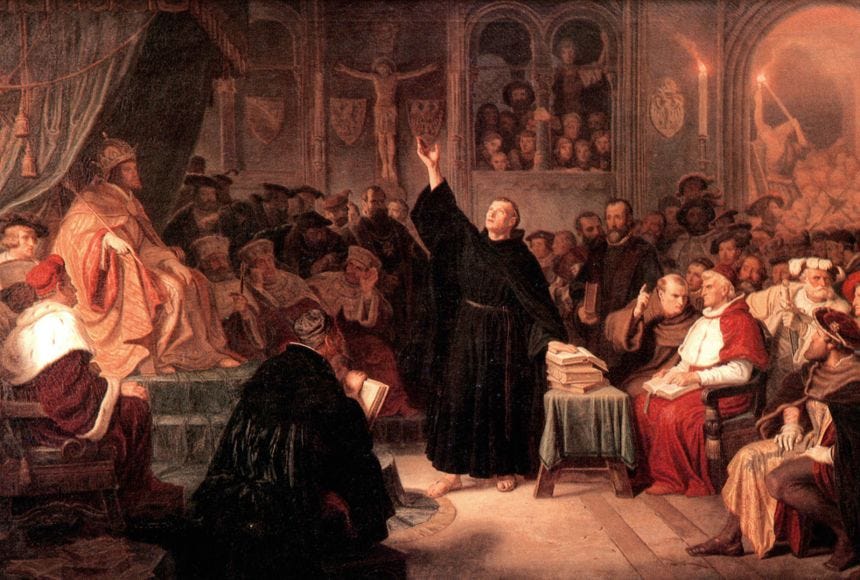The necessity for Church unity.
Increasingly, I am receiving messages from my brothers and sisters in Christ, which appear to be an attempt at dividing the kingdom. The number of sectarian comments and direct messages is concerning. But then, I suppose we are tribal by nature.
It appears to me that some people are stuck in the Reformation in much the same way that many a Remainer is immovable from the Brexit referendum, and in the same way some Americans could not get past the election results of either 2016 or 2020, #notmypresident.
As an Anglican, and an Anglo-Catholic at that, I don’t easily fit into any of the usual boxes, and that can be difficult for some people. I don’t subscribe to papal infallibility, but I do pray the rosary daily; I love the Book of Common Prayer, but I go to Mass regularly. I am not confused, my theology has been perfectly articulated by many scholars before me, from William Laud to Edward Pusey, King Charles I to Vernon Staley. I see the Anglican Church as the English expression of the Catholic faith and the Reformation as an unfortunate necessity – recovering the Gospel, returning to the Church Fathers, restoring the faith and ridding the Church of corruption and superstition. All very noble ideas in principle, and as Mark Twain is accredited as saying, “Whenever you find yourself on the side of the majority, it is time to reform, pause or reflect.” Lord knows the Church needed reform. Papal corruption (armies, empires/dominions, illegitimate families, greed) and dodgy practices (the ‘selling’ of indulgences) needed addressing. But in the process of reforming, the more puritanical Protestants took to being anti-Catholic, in opposition to the majority who saw the reformation as pro-Catholic, if anything. That problem has never been resolved. Whilst many Puritans were driven out of the Church, wars raged, attempted coups were fought off, and tribal lines were drawn in the sand. I am, of course, condensing a vast period of history, but the point I am trying to make is that, as Christians, we were never intended to be divided. Schism is not good, separation is not to be desired, and we should pray and work toward a united Church. The Council of Vatican II reported that Catholics today should not hold Protestants of today to blame for the sin involved in the separation, and I think that works both ways. We should focus on the things that unite us, such as our faith in Christ, over the things that divide us, such as our worship styles.
It is also worth mentioning I will not even entertain the tired revisionist argument that the Church split entirely because King Henry VIII wanted to re-marry. That dismisses the call for reformation from the continent, ignores the Catholicity of Henry VIII, and forgets we were still a Catholic nation until Elizabeth I was excommunicated by Pope Pius V. The English people maintained their Catholic faith and chose to submit to the King over a foreign Pope. They didn’t instantly become ‘Anglicans’ in the sense that we use the word today. The Church of England was historically Catholic (I shall write a separate piece on that), and followers were described as Anglicans as far back as 1215, centuries before the Reformation. Anglicanism is a 19th-century innovation – encompassing the ‘via media’ approach of the Reformation, being broad enough to allow for nuanced disagreements in doctrine (i.e. real presence vs transubstantiation, or sola scriptura vs prima scriptura) and worship (evangelical, charismatic, catholic). For better or for worse.
The two camps that are most prominent in my inboxes at the moment are the Roman Catholics and the Protestants:
There are the Roman Catholics, who claim to own the Truth and claim to belong to the “one true Chuch”. Christ is the Truth; no one owns Christ. The Church is Christ’s body; all those baptised in the name of God the Father, the Son and the Holy Spirit are members of that body. Christ founded his Church and instructed his apostles to spread the Gospel – he didn’t tell Peter and Paul in Rome to disregard Andrew in Constantinople, Mark in Alexandria or Thomas in the East. Where institutions drive us apart, Christ brings us together. Roman Catholics who claim to be the only ones to be saved sound more like the Calvinists they purport to oppose. There is charity in the common statement, ‘come home’, that is for sure. But there is also an incredible lack of humility in the assumption that they have all the answers and have no need for reformation. The Holy Spirit does, indeed, work through the Church – but the Church is also an attractive target for the Devil. We must not forget that. No institution made up of sinners can ever be perfect.
Then there are the Protestants, who seem to think Catholics are not even Christians. The Protestants who constantly misinterpret Catholic doctrine – and it must be on purpose because they have been defined and explained so clearly for centuries – especially on the Mass, the veneration of the BVM Mary, the invocation of the Saints and prayers for the dead. Protestants who think they understand the Bible better than their Catholic brethren. The assumption is that they’re the only ones to have ever read and/or understood the Bible properly, and in doing so, they disregard the wisdom of the Church Fathers. These are the Protestants to whom Church history began 500 years ago rather than 2,000 years ago. The problem here is that they spend so much time being anti-Catholic, they are no longer reforming, they are corroding. The physical repulsion to any beauty in worship shows the vacuous nature of Puritanism that has seeped into Protestantism over time. Beauty is transcendental – it takes us out of ourselves and redirects our gaze toward God. That is what good art should do, as well as holy music and ritualistic worship. A solid liturgy should help us empty ourselves of our inner desires and facilitate our prayer, to be filled with God’s will. How can any Christian be against beautiful worship?
There is no wonder Christianity is in decline in the West. We cannot acknowledge our brothers and sisters in Christ because we are too focused on our theological and liturgical differences. Sectarianism is as much a threat to the Church as wokeness and Mohammedanism.
We may not all be in Communion with each other. But we are all in Communion with Christ. That should be a good starting point.
Whilst we remain divided amongst ourselves, the enemy grows stronger and more targeted. We are doing the enemy’s job for them.
I am sure I am not the only one who observes these fault lines in comments/DMs/replies. The RCs say, “come home”. The Prots say, “avoid Romish superstition”. Fewer and fewer Christians say, “The grace of our Lord Jesus Christ be with you.”
There are bigger, more urgent battles to be fought. There are those who would drag the Church into apostasy with heretical views on issues of human sexuality, denigrating the sacrament of holy matrimony. Same-sex marriage is not an issue exclusive to Anglicans; it is also a threat in Roman Catholicism, thanks to the German bishops and the Synod on Synodality.
The argument about which corner of the Church contains the most errors is a fatal one. Any institution made up of fallen individuals will have problems. The twentieth century has not been kind to either camp. Contraception, women’s ordination, trans-re-baptisms, and now same-sex blessings have been tearing apart the Anglican Communion, whilst the liberal progressive spirit of Vatican II, the child abuse scandal, and now the suppression of the Traditional Latin Mass have been ripping apart Rome.
We are not heeding the warnings.
It is our duty to save souls by leading them to Him. Our Great Commission is to disciple the nations. Not each other. If we spent half as much time preaching the Gospel to the world as we do fighting amongst ourselves, we’d be fulfilling our calling and pleasing God.
As Christianity declines in the West, the battle is no longer between Roman Catholic and Protestant denominations, or even amongst us Anglicans, between Ango-Catholics and Evangelicals. The battle now is increasingly between orthodox and heterodox, between conservatives and liberals. We must band together, Catholics, Anglicans, Orthodox, Evangelical, Baptist, Methodist, and Pentecostal, to protect the faith against liberal-progressive secularisation. To do that, we must live out our faiths fully and in unity.
Vouchsafe, we beseech Thee, Almighty God, to grant unto the whole Christian people unity, peace, and true concord, both visible and invisible; through Jesus Christ our Lord, who liveth and reigneth with thee and the Holy Spirit, one God, forever and ever. Amen
Fr. Calvin Robinson


